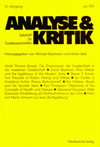ohne Titel

1983 (5) Issue 1
Editorial
Von der rapiden Verbreitung leistungsfähiger Computersysteme während der letzten 20 Jahre hat in der Soziologie vor allem die Statistik profitiert. Die Anwendung komplizierter statistischer Modelle stellt bei der Benutzung komfortabler Analysepakete heute kein Problem mehr dar: Was früher tagelange mühsame Arbeit mit dem Tischrechner erforderte, erledigt man heute durch das Ausfüllen einiger Lochkarten mit ein paar Minuten Rechenzeit.
Inwieweit hat die Anwendung komplexer statistischer T...
Table of Contents
Title: Methode, Statistik und Modell in den Sozialwissenschaften
Author: Gerhard Arminger
Page: 3-36
"Was sich überhaupt sagen lä ßt, lä ßt sich klar sagen; und wovon man nicht reden kann, darüber mu ß man schweigen."
(Wittgenstein: Vorrede zum Tractatus logico - philosophicus)
Abstract: The relationship between methods, statistics and models in the social sciences is discussed. New models generalizing commonly used linear models to deal with qualitative and ordinal data are introduced; their basic similarity to linear models is pointed out. Rate models and stochastic linear differential equations to model social processes in continuous time are mentioned. The implications of weak substantial theory and the correct use of statistical significance tests for any kind of model are demonstrated.
Title: Multivariate Modellbildung für metrische Daten
Author: Dieter Holtmann
Page: 37-82
Abstract: The application of multiple regression and path analysis is discussed in regard to the exclusive use of the beta coefficients. Beta is one of the possible ways of controlling for the effects of the remaining predictors, others are part and partial correlation, part and partial covariance. A typology is developed for the difference between total and controlled effect. With this instrument (for controlled effect = beta) it can be shown under which conditions the sum of the total explaining power (r2y, xi) and the sum of the additional explaining power (Part correlation2) do exceed or not Multiple R2. By the criteria of sign rule and of the relative advantages of the decomposition of total effect in controlled effect and rest effect it is argued that beta is still the best way (of those considered) of control. Next some problems of the otherwise recommended LISREL approach are discussed: Estimation, data-fitting versus model test, model-fitting, standardization. Finally some parallels between models for metric and models for non-metric data are specified.
Title: Richard Rorty - Two Philosophers or one?
Author: Alan Montefiore
Page: 83-96
Abstract: Rorty makes a number of broadly convergent distinctions between different types of philosopher or philosophy. His own expressed view - or apparent view - that what he calls abnormal or edifying discourse is parasitically dependent on a prior acceptation of the norms of normality is fundamentally, even 'foundationally', correct. Any too reckless or too persistently sustained defiance of these norms or of this dependence is bound to involve a refusal of various orders of responsibility; including perhaps both moral and political responsibilities. There can, of course, be no straightforward proof that Rorty's texts, stimulating and fruitful as they indisputably are, involve any of these irresponsibilities; indeed, he would no doubt accept the gist of much of the argument which seeks to make them explicit. It is nevertheless worrying to find him saying the things that he does say about the allegedly unbridgeable differences between 'continental' and 'analytic' philosophy; and though he might reply that one should not here take what he says as being the expression of a view on a matter of so-called fact, the factual inaccuracies of the views that he might 'normally' be taken to be expressing here are only too likely to be more misleading than fruitful, more harmful than harmless.
Title: Der intersubjektive Faktor. Bemerkungen zu Richard Rortys erkenntnistheoretischem Behaviorismus
Author: Wolfgang R. Köhler
Page: 97-113
"Der Erkennende vermeidet die Selbsterkenntnis und lä ßt seine Wurzeln in der Erde stecken." Nietzsche
Abstract: The following article is only in part a review of Rorty's "Philosophy and the Mirror of Nature". First I sketch the development of the two leading metaphors, which Rorty considers as being central for epistemology, namely the mirror of nature and the eye of the mind. Then I try to bring out the antirealist implications of Rorty's socalled "epistemological behaviorism" and to make sense of his slogan that truth is merely warranted assertability which in my view seems not to be in line with his favouring truth-conditional semantics. Thirdly I point to some possible consequences for the social sciences of using the antirealist "criterial" semantics of the later Wittgenstein, one of Rorty's heroes.